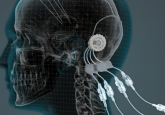SfN17: Study uncovers rapid plasticity in the active manipulation of neuroprosthetics

In a novel study presented at the Society for Neuroscience’s annual meeting (Washington DC, USA; 11–15 November 2017), researchers have demonstrated that if a brain-machine interface (BMI) makes an error, the human brain is able to quickly adapt to correct the mistakes. BMIs are devices that translate neuronal information into commands capable of controlling external software. For patients who are no longer able to move their limbs, these devices offer a chance to partially regain lost motor and communication abilities. In this study a female patient with tetraplegia was implanted with a 96-electrode array in her anterior interparietal cortex, a...




